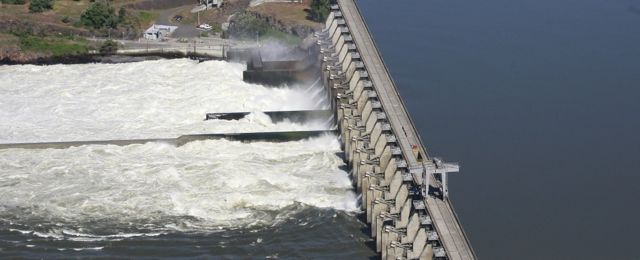forum
library
tutorial
contact

Spill is the Breaching Alternative for Salmon
by Kevin RichertIdaho Statesman, June 16, 2012
|
the film forum library tutorial contact |

|
Spill is the Breaching Alternative for Salmonby Kevin RichertIdaho Statesman, June 16, 2012 |
 Sometimes, scientists have a way of reaching conclusions that make everybody uncomfortable.
Sometimes, scientists have a way of reaching conclusions that make everybody uncomfortable.
This happened a few weeks ago, when scientists from the federal government, Indian tribes and the Northwest states suggested a possible path forward for salmon recovery.
Their conclusion: By increasing "spill," the water that goes over and not through the region's hydroelectric dams, more young salmon will be able to make their springtime migration to the Pacific Ocean. This could result in increased salmon returns, perhaps to the point that the endangered fish could recover without breaching four dams on the lower Snake River.
The group's Comparative Survival Study won't end the debate over dam-breaching -- and it shouldn't. But it forces groups on both sides of the breaching debate into a box.
For spill opponents, the dilemma is obvious. Every drop of water that spills over the dams is a drop that doesn't run through a hydroelectric turbine. The Comparative Survival Study contemplates a 15 to 20 percent increase in spill, which would leave a little less than half of the water in the Snake and Columbia River system available for hydro production. If you view these rivers as a source of power -- the cheap power that has been a Northwest economic staple for decades -- then spilled water is wasted water.
"This oversimplified analysis and stubborn adherence to a one-word rallying cry -- 'spill' -- calls into question the credibility of this and similar studies," Terry Flores of Portland, said in a recent letter to the editor. Flores is executive director of Northwest RiverPartners, a coalition of utilities, farmers and barging advocates that opposes not only spill, but dam breaching as well.
Unfortunately for Flores and like-minded defenders of the status quo, this latest study underscores a basic point: Sustained salmon recovery is going to require fundamental changes in river operations.
And for environmental groups -- the salmon advocates who, for years, have pushed for changes in river operations -- this latest study is something of a mixed result. Yes, the scientists are presenting spill as an alternative to breaching, which can't sit well with groups that have made breaching the centerpiece of the salmon recovery cause. But the scientists are pressing the case for spill, and Tom Stuart, a Stanley motel owner and Idaho Rivers United board member, sees the positive in that.
"It's probably the best tool we have, with dams in place," he said recently.
The Statesman has a stake in this debate as well. We have advocated dam breaching since 1997, an argument I've advanced numerous times in my 11 years on this job.
So what becomes of the dam breaching argument now? Stuart and Idaho Rivers United Executive Director Bill Sedivy make a good argument about the current state of the salmon. Numbers are up, and that's the result of a variety of factors. That includes spill, as ordered by James Redden, the Portland federal judge who struck down three salmon recovery plans from three presidential administrations. That also includes an aggressive, and costly plan to flood the river system with hatchery-raised salmon smolts. And it includes a factor beyond the control of any federal agency or judge: favorable (but always volatile) ocean conditions that allowed more salmon to reach adulthood and return to their spawning rivers.
In other words, a lot of things have gone right for the salmon over the past few years. That's good news, of course. But Redden, now retired, has watched the ups and downs and the vagaries of the region's salmon for more than a decade. Now that he is free to say whatever he wants to say about the matter -- and publicly advocates breaching, as he did in April -- the region should pay attention.
Which does not take away from the region's salmon scientists, and the statement they made in their April study. Since breaching is a costly and controversial proposition, and unlikely to occur in this current political climate, then this region needs to do something in the meantime. The best something available in the toolbox is spill.
Related Pages:
Fisheries Scientists Redefine the Salmon Debate by Trumpeting more 'Spill' by Rocky Barker, Idaho Statesman 4/22/12
learn more on topics covered in the film
see the video
read the script
learn the songs
discussion forum
